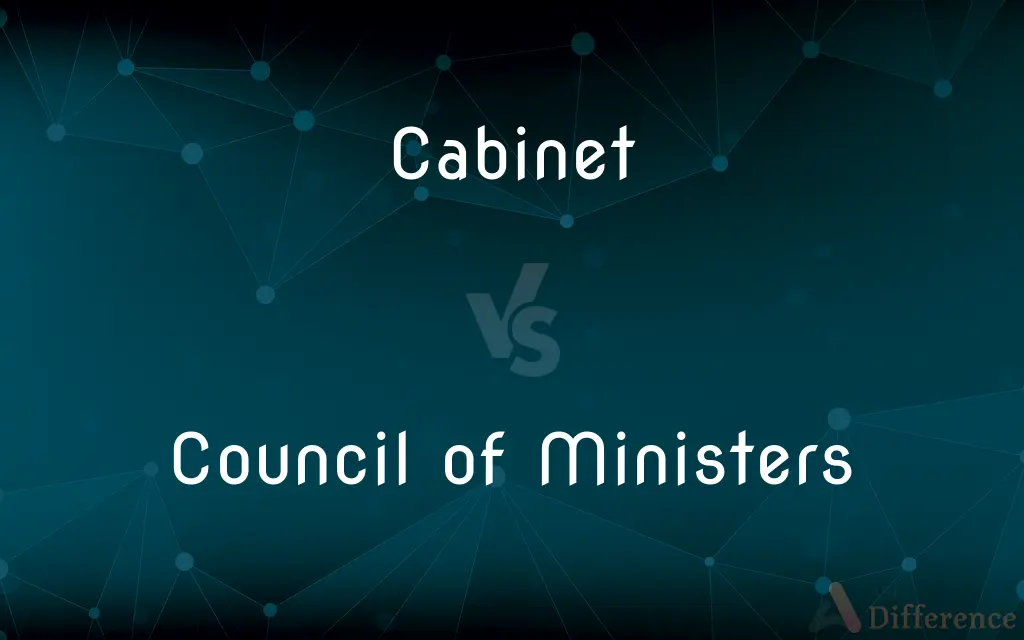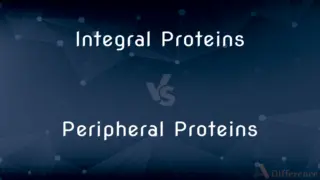Cabinet vs. Council of Ministers — What's the Difference?
Edited by Tayyaba Rehman — By Fiza Rafique — Published on December 31, 2023
The Cabinet is a core group of top ministers responsible for key decisions, while the Council of Ministers consists of all the ministers overseeing various departments.

Difference Between Cabinet and Council of Ministers
Table of Contents
ADVERTISEMENT
Key Differences
The Cabinet and Council of Ministers play pivotal roles in governance, with the former being a subset of the latter. The Cabinet's exclusive nature means it includes only key ministers, while the Council of Ministers is more extensive, encompassing all ministerial positions.
In terms of decision-making, the Cabinet generally holds a more prominent role, addressing significant policy matters and urgent issues. Conversely, the Council of Ministers is more about collective responsibility, with every minister responsible for their respective department.
The composition of the Cabinet usually reflects the top-ranking members of the governing party or coalition, whereas the Council of Ministers portrays a broader representation of the government's full scope, which may include junior ministers or ministers of state.
The frequency of meetings and the agenda can differentiate the Cabinet from the Council of Ministers. The Cabinet tends to meet more frequently, focusing on urgent and high-priority matters, while the Council of Ministers might convene for broader discussions or specific portfolios.
Summarily, while both the Cabinet and Council of Ministers work cohesively for governance, their roles, composition, and responsibilities differ. The Cabinet's streamlined nature helps expedite decisions, while the Council of Ministers ensures all departments are represented.
ADVERTISEMENT
Comparison Chart
Composition
Subset of Council of Ministers; key ministers.
All ministers, including junior and senior.
Decision-making
Handles significant policy matters.
Collective responsibility for respective departments.
Frequency of Meetings
Tends to meet more frequently.
Might convene less frequently, based on portfolios.
Rank
Top-ranking members of the governing party/coalition.
Broader representation, including junior ministers.
Function
Focuses on urgent, high-priority issues.
Ensures representation and functioning of all departments.
Compare with Definitions
Cabinet
A core group of key ministers in a government.
The President consulted the Cabinet before making the announcement.
Council of Ministers
Ministers responsible for various government departments.
Each member of the Council of Ministers presented their quarterly report.
Cabinet
A subset of the Council of Ministers.
The Prime Minister reshuffled the Cabinet for better efficiency.
Council of Ministers
Entire team of ministers in a government.
The Prime Minister addressed the Council of Ministers about the reforms.
Cabinet
An upright, cupboardlike repository with shelves, drawers, or compartments for the safekeeping or display of objects.
Council of Ministers
Combination of senior and junior ministers.
The new members were welcomed into the Council of Ministers.
Cabinet
(Computers) The box that houses the main components of a computer, such as the central processing unit, disk drives, and expansion slots.
Council of Ministers
Collective representation of a government's scope.
The education policy was approved by the Council of Ministers.
Cabinet
Often Cabinet A body of persons appointed by a head of state or a prime minister to head the executive departments of the government and to act as official advisers.
Council of Ministers
Body encompassing all ministerial roles.
The Council of Ministers met to discuss the annual budget.
Cabinet
(Archaic) A small or private room set aside for a specific activity.
Cabinet
Rhode Island & Southeastern Massachusetts See milkshake.
Cabinet
Suitable for storage or display in a cabinet, as because of size or decorative quality.
Cabinet
Of, relating to, or being a member of a governmental cabinet
Cabinet matters.
A cabinet minister.
Cabinet
Used in the making of cabinets
Teak and other heavy cabinet wood.
Cabinet
A storage closet either separate from, or built into, a wall.
Cabinet
A cupboard.
Cabinet
The upright assembly that houses a coin-operated arcade game, a cab.
Cabinet
(historical) A size of photograph, specifically one measuring 3⅞" by 5½".
Cabinet
A group of advisors to a government or business entity.
Cabinet
In parliamentary and some other systems of government, the group of ministers responsible for creating government policy and for overseeing the departments comprising the executive branch.
Cabinet
(Kentucky) A cabinet-level agency in the executive branch; that is, an agency headed by a member of the governor's cabinet.
Cabinet
(archaic) A small chamber or private room.
Cabinet
(often capitalized) A collection of art or ethnographic objects.
Cabinet
Milkshake.
Cabinet
(obsolete) A hut; a cottage; a small house.
Cabinet
An enclosure for mechanical or electrical equipment.
Cabinet
A hut; a cottage; a small house.
Hearken a while from thy green cabinet,The rural song of careful Colinet.
Cabinet
A small room, or retired apartment; a closet.
Cabinet
A private room in which consultations are held.
Philip passed some hours every day in his father's cabinet.
Cabinet
The advisory council of the chief executive officer of a nation; a cabinet council.
Cabinet
A set of drawers or a cupboard intended to contain articles of value. Hence:
Cabinet
Any building or room set apart for the safe keeping and exhibition of works of art, etc.; also, the collection itself.
Cabinet
Suitable for a cabinet; small.
He [Varnhagen von Ense] is a walking cabinet edition of Goethe.
Cabinet
To inclose
Cabinet
A cupboard-like repository or piece of furniture with doors and shelves and drawers; for storage or display
Cabinet
Persons appointed by a head of state to head executive departments of government and act as official advisers
Cabinet
A storage compartment for clothes and valuables; usually it has a lock
Cabinet
Housing for electronic instruments, as radio or television
Cabinet
Principal decision-making body in governance.
The Cabinet approved the new economic policy today.
Cabinet
Group of top-ranking officials in the executive branch.
The nation awaited the Cabinet's decision on the crisis.
Cabinet
Ministers with prime portfolios in governance.
The defense and finance heads are essential members of the Cabinet.
Common Curiosities
Who typically heads the Cabinet?
The Prime Minister or President, depending on the country's governance structure.
Who can be a part of the Council of Ministers?
It includes all ministers, both senior and junior, overseeing various departments.
What is the main difference between the Cabinet and Council of Ministers?
The Cabinet is a core group of key ministers, while the Council of Ministers includes all ministers.
Which body has a more extensive representation of the government?
The Council of Ministers, as it includes all ministerial positions.
How often does the Cabinet meet compared to the Council of Ministers?
The Cabinet tends to meet more frequently, addressing high-priority matters.
Can members of the Cabinet be changed?
Yes, there can be reshuffles, with members being added or removed based on decisions by the head of government.
Does the Cabinet have more decision-making power than the Council of Ministers?
Generally, the Cabinet handles significant policy matters and has a more prominent role in urgent decisions.
Are all members of the Cabinet part of the Council of Ministers?
Yes, the Cabinet is essentially a subset of the Council of Ministers.
What's the significance of the Council of Ministers?
It ensures that all government departments are represented and function efficiently.
Is the Cabinet's decision always final?
While the Cabinet plays a significant role, some decisions may require broader consensus or legislative approval.
Who appoints the Council of Ministers?
Typically, the head of state, based on the recommendation of the head of government.
Share Your Discovery

Previous Comparison
Integral Proteins vs. Peripheral Proteins
Next Comparison
Opportunity Cost vs. Trade OffAuthor Spotlight
Written by
Fiza RafiqueFiza Rafique is a skilled content writer at AskDifference.com, where she meticulously refines and enhances written pieces. Drawing from her vast editorial expertise, Fiza ensures clarity, accuracy, and precision in every article. Passionate about language, she continually seeks to elevate the quality of content for readers worldwide.
Edited by
Tayyaba RehmanTayyaba Rehman is a distinguished writer, currently serving as a primary contributor to askdifference.com. As a researcher in semantics and etymology, Tayyaba's passion for the complexity of languages and their distinctions has found a perfect home on the platform. Tayyaba delves into the intricacies of language, distinguishing between commonly confused words and phrases, thereby providing clarity for readers worldwide.













































